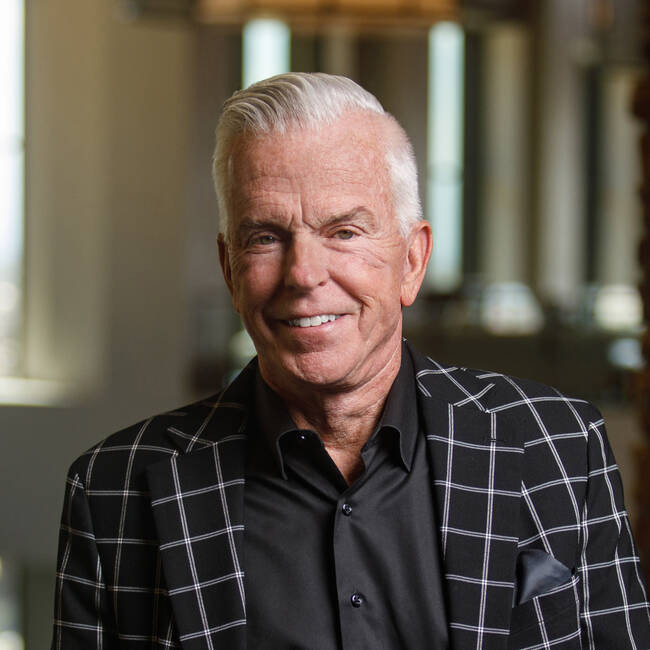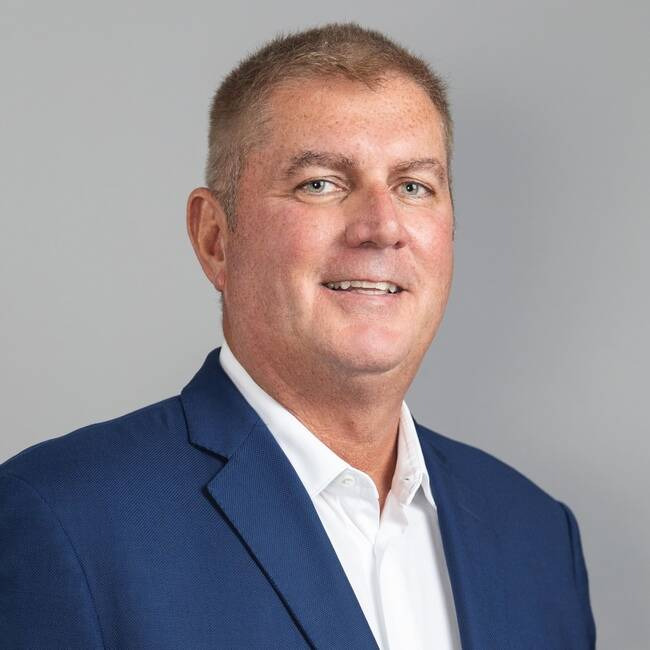Thank you for making the trek to Washington to help our county officials think positively about their communications! . . . I'm sure you know that the attendees went away happy and energized. Your packet of materials was impressive.

James Lukaszewski
Corporate Coach, Author and Speaker
Profile Links
Fee Range
$7,500Travels From
Minneapolis–Saint Paul., MN, US
James Lukaszewski
Biography
James (Jim) E. Lukaszewski (Loo-ka-SHEV-skee) is one of America's most visible corporate go-to people for senior executives when there is trouble in the room or on the horizon. As America's Crisis Guru , Lukaszewski is known for his ability to help executives look at problems from a variety of sensible, constructive and principled perspectives. He has spent his career counseling leaders of all types who face challenging situations that often involve conflict, controversy, community action or activist opposition. He is known for taking a business approach rather than traditional PR strategies by teaching clients to take highly focused, ethically appropriate action. He is a consummate storyteller.
Lukaszewski has helped leaders in organizations large and small in literally every standard industrial classifications (SIC), for-profits, non-profits, government, military, private and public organizations. He is always retained by senior management to directly intervene and manage the resolution of corporate problems and bad news while providing personal coaching and executive recovery advice for executives in trouble or facing career-defining problems and succession or departure issues.
Throughout his career, beginning in 1974, his skills, knowledge, ability and professional leadership have been recognized continuously. His biography has appeared in more than 30 editions of various Who's Who annual editions; he has been recognized for lifetime achievement in his profession by most of the major public relations organizations in the United States. He served for 22 years on the Public Relations Society of America's Board of Ethics and Professional Standards (BEPS) and is now its first Emeritus member. His twelve books and hundreds of articles and monographs have informed the profession for decades. Wherever you study public relations on the planet, you'll read something or see something from or by Jim Lukaszewski.
James Lukaszewski
Featured Keynote Programs
Leadership
- The Ingredients of Leadership: Gaining the Personal Power to Move People and Organizations into the Future
How to lead others to have happier, more productive, less contentious and richer lives. Ten crucial behaviors, personal decisions and leadership choices to help those who lead, and their advisors, become outstanding individuals.
- Transforming Managers into Leaders: Seven Sensible Constructive Strategies
How to release the leader that lives within you. A personal process for communication and achievement; understanding the nature and patterns of leadership; how management differs from leadership; how to unlock your personal potential for leadership. How to help you or your best and brightest become better and brighter.
- You are the Table, Why Your Boss Should Listen to You! The Seven Disciplines of the Trusted Strategic Advisor
You are the table. Stop searching for it. How to build your personal influence and access by understanding what bosses need, want, look for and expect in a trusted strategic advisor. Giving crucial advice.
- Inside the Mind of the Modern CEO: Leaders Constantly Under Fire
Seven crucial CEO survival strategies. Who these modern CEOs are. Where they come from. What they want. How long they’ll survive. How their world has changed and is changing. Their fears, uncertainties, doubts, delusions and disconnects.
Communication Strategies
- Communicating Intentionally: Building a Trusted, Participatory Communications Process in Your Organization
How to develop a viable, doable, achievable and useful communications strategy. The eight crucial ingredients of an important, sensible and compassionate organizational communication strategy: Candor, Openness, Truthfulness, Responsiveness, Transparency, Engagement, Destiny Management, Empathy/Apology.
- Influencing Employee Attitudes: A New Way to View, Understand and Rejuvenate Your Organization
Examines the seven categories of employees from live-to-work to disengaged staff members. Who are these people who come to work each day? Why do they come? Why do they stay? How to refocus employees at every level on what matters. How to really lead your organization, from the front.
- 60 Minutes on Media Relations
How to survive in a world where deadlines are instant, total strangers are managing your destiny, everybody’s a journalist and everything said about you is available to anyone 24/7 forever. Getting ready to talk.
- Waging Peace at Work: Reengaging Leaders, Winning When Everybody’s Upset
Sometimes it takes tough times to make tough changes. How organizations and their leaders fail to communicate, even in good times. Why employees won’t listen. New ways to rethink, refocus, perhaps restructure your employee relationships, goals and objectives. Learn how to tap the real power of employee engagement.
Crisis Management
- Dealing with Angry Publics
When corporate behaviors and decisions collide with the community, employee or constituent expectations and values, the result is often anger, cynicism, confrontation, even organized opposition and confrontation. Learn how to calm things down, reduce victimization and avoid the production of new critics, enemies and angry people; useful, sensible, constructive approaches and strategies to mitigate, manage and stabilize emotionally charged situations.
- The Golden Hour: The 5-Step Grand Strategy for Successful Crisis Response
In crisis response, speed beats smart every time. Discover strategic patterns of response that can begin the resolution of crises if begun within the first 60-120 minutes, the Golden Hour. Stop producing victims; manage the victims; short, powerful communication techniques; dealing with the self-appointed, bloggers, bloviators, bellyachers, back-bench critics and commentators, and traditional media.
- Crisis Proofing Your Organization
Learn Jim’s unique six-step dynamic approach for a crisis response action process that will control and reduce contention, and address the most crucial issues directly and promptly. Prepare your organization and leadership for the visibility that will inevitably happen. How to protect your reputation and maintain trust.
- Managing Victims: The Most Powerful Force in Crisis
How victims are managed determines the perception of your response, the level of your integrity and the future of your reputation and perhaps even the CEO’s career. A unique, powerful, surprising and emotional discussion of the most powerful force in any crisis – the victims. Who they are; the causes of victimization; how victims feel, how they react, what they suffer, what they need; and how victims can control your organization’s destiny and your professional future.
- Preparing for Digital Disaster
Prepare first for the nine tactics online activists always use: how to prepare for the 20 types of cyber-attacks and avoid the seven traits of a failed response that assure serious reputational damage. Create a (SMART) process: a social media attack/action response team to learn how to reduce social media attacks and even reverse the process.
- Waging Peace and Rebuilding Trust in Your Community: The Story of Every Angry Town
Strategies for regaining trust, gaining and maintaining permission, resolving conflicts and controversy, and calming everybody down. Specific, proven strategies for establishing powerful stakeholder relationships, dealing candidly, openly and compassionately with the pain and suffering the community may be feeling; focusing on resolving issues, getting to agreement, reducing contention and building a more powerful, positive future for your organization and your community.
Ethics
- Bringing Out the Best in Your Company
An interesting and powerful discussion of the key attributes of the best organizations using a unique seven ingredient template approach to guide your organization to be the best it can possibly be. The best core concepts; the best core ethical principles; the best code of integrity on learning inappropriate behaviors; handling ethical dilemmas and difficult issues; best people, best products, best relationships, best work, best practices.
- The Ethical Expectations of Leadership
Leaders must implicitly and explicitly recognize the ethical expectations by everyone inside and outside the organization. Focus groups, polls and interviews reveal a powerful list of ethical expectations, including truth-finding, raising tough questions, teaching by parable, vocalizing values and ideals, walking the talk, ethical enforcement, finding ethical pathways, being a model for ethical behavior and making values more important than profits.
- Building Trust is Tougher than Ever; Remaining Trustworthy is Hard
Why? More critics from more quarters, more explosive exposure in today’s social media world; much greater expectations for openness and accountability. This is a discussion of a manifesto for trustworthy leadership and the attributes of a trustworthy organization or person and about regaining trust and forgiveness after trouble and disruption. A powerful, sensible, riveting program.
- The Ethics of Excellence
Based on Price Pritchett’s wonderful treatise, “The Ethics of Excellence,” featuring his Code for the Road: listen to your conscience, prepare to be punished for honesty, react to smells, permit mistakes to avoid cover-ups, show what you believe about ethics, and lots more. The buck stops with you. You know it does because your mom told you.
James Lukaszewski
Featured Reviews
Frequently Asked Questions
How do I book James Lukaszewski for my event?
- Availability Check: Contact us with your event date and budget to verify if your desired speaker is available.
- Hold Date: We place a temporary "hold" on the speaker's calendar while you finalize internal approval.
- Contracting: We issue a contract outlining the fee, cancellation policy, and event expectations.
- Logistics: Once signed, our event management team handles all travel booking, itinerary, and AV requirements.
Why should I partner with Premiere Speakers Bureau rather than contacting speakers directly?
What makes Premiere Speakers Bureau unique compared to other agencies?
How does Premiere Speakers Bureau's 'Zero Cost Service' model work?
How are speaker fees structured, and what is typically included?
What are the standard policies for speaker travel and expenses?
James Lukaszewski's Featured & Related Topics
Find Similar Speakers Leadership
Popular Speakers

Ron Clark

Daymond John

Deion Sanders

Liz Bohannon

Dr. Ben Carson

Valorie Burton

Dr. Jessica Kriegel











